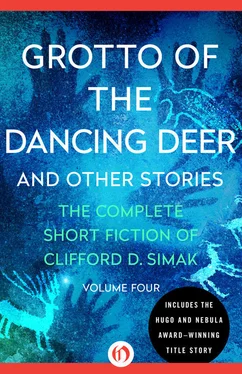Benton had no need to take his own graphs out of the desk; he knew them now by heart. Staring at Smith’s graphs laid out on the desk top, he knew immediately they were almost identical with his own.
He sat down weakly in his chair, grasping the arms so tightly that his fingers ached.
“I was right,” he told himself. “God help us, I was right!”
4
When bird season opened, Benton drove out to the Ezra Pike farm for an afternoon of pheasant shooting, jotting down a mental note that before the day was over he would ask about the Barrs, who were Pike’s next-door neighbors. But he never got around to it.
Pike had a lot to show him: the pen of shoats that were becoming sleek and plump for the late-fall market; the high-quality wheat from the little patch he had grown as a hobby and which he was intending to take in to Millville to an old-time water mill to be ground into flour by a genial, half-mad hermit who was unconvinced that he lived in the twentieth century; the ritual sampling of some cider Pike had run off, using the fruit from an ancient, withered tree, the only one remaining in the country that bore the famed snow apples of another day. There was politics to talk about and the rising prices of food; the gasoline-wasting propensities of the anti-pollution equipment which had been installed on cars; the latest, rather mild scandal of the neighborhood, involving a boy barely out of his teens and a widow who was old enough to be the lad’s grandmother. They shot some pheasants, ate fresh apple pie—washing it down with milk—and talked of many things, the time passing pleasantly.
It was not until he was halfway home that Benton remembered he had not asked about the Barrs.
The following Saturday he skipped his morning office hours, loaded his gun into the car trunk, and took off for the hills, ostensibly to shoot quail. He made the quail trip several times each autumn, but when he thought about it he realized that it was not the quail he was looking for now, but the time that he could spend with the hill people.
If one had asked them what they were, they would have said that they were farmers; but precious few of them did any actual farming. Their acreages mostly stood on end, with only here and there a creek bottom or a hillside bench that was level enough for a plow to turn the soil. They planted some corn to fatten up the scrawny hogs that mostly ranged the woods for acorns, a field of potatoes at times larger than the corn patch, and a slightly smaller garden. They might at times plant other crops as well, but mostly it was corn, potatoes, and the plants in the garden. The women canned a lot of vegetables, for there was no electricity to freeze them, and even if there had been, few of the hill people could have scraped together the money for a freezer. There were strawberry beds for eating and for canning as well as wild fruits such as blackberries and raspberries. By the end of autumn, the cellars of the hill farm homes were well stocked with canned vegetables and fruits, with potatoes and “winter keeper” apples from the scraggly trees of their haphazard orchards.
As he drove, Benton fell to wondering, as he had many times before, just how the hill folk managed to live from year to year. Each family ordinarily had a cow or two, as well as a few hogs and a bedraggled flock of chickens. Most of the hogs were butchered for meat rather than sold on market, and many of the farms had smokehouses out in back in which hams and bacon were cured. Game such as rabbits, squirrels, coons, and an occasional deer—usually taken in a fine disregard of game laws—helped round out their diet. Fish from the many streams, as well as ruffed grouse and quail, were often on the table. Somehow or other they managed to eat rather well all the year round.
But they had little money. They were largely self-sufficient and they had to be, raising and gathering most of their food. They bought little at the grocery store: flour, sugar, coffee, salt … Living that way, Benton told himself, they didn’t need much money. What little they had they earned at odd jobs here and there. A few of them worked at small industrial plants in the valley, but not very many of them. He suspected that few had any taste for such work. Occasionally some of them peddled firewood to the townspeople.
But, despite all the hardships which they probably did not regard as such, they were a relatively happy, reliable, proud, and independent people, filled with dignity and inborn courtesy.
Benton had a good day, dropping in at the homes of several families that he knew. He did a little hunting, but not a great deal, getting, in all, three quail. But he did a lot of talking, sitting on the steps of the sagging verandahs of houses so old that moss grew upon the clapboard and the brick—houses there so long that they were accepted even by the environment in which they sat as a part of that environment—or as he roosted on a split-rail fence that might have been erected a hundred years before or stood in the coolness of a springhouse after he had drunk a dipper full of ice-cold buttermilk.
They talked of many things, he and these scarecrow men with carefully sewn patches on their pants, their hair grown long not because long hair was in style but because no one in the family had as yet gotten around to cutting it. They talked of the weather, which bore heavily on their minds and was worthy of lengthy conversation; of someone having seen a panther, although wildlife biologists were agreed there had been no panthers in these hills for almost forty years; of times long gone and tales told by forebears now only dimly remembered.
In the course of these conversations Benton always got around to mentioning the exhaustion syndrome—although he did not use that term—explaining how patients for no apparent reason were gaining weight, were feeling all tired out in the middle of the morning, and had a seemingly never-satisfied longing for sweets. He didn’t know what caused it, he told them; and he was somewhat upset about it and was wondering if there might be any such condition in the neighborhood.
They looked at him with ill-concealed laughter in their eyes and said, no, unless that was what might be wrong with Grandpa Wilson or Gabby Whiteside or any one of another dozen people. They regaled him with stories of fabulously lazy men who, all their lives, had worked much harder to avoid work than the work would have been itself. But their tales all had the ring of folklore to them, so Benton accepted them as such. Most of the shiftless men who peopled the stories, he realized, did not exist and never had existed.
He came home convinced that no signs of Abbott’s epidemic existed in the hills.
It could be body chemistry, he told himself—something in the hills, the way of life, the things they ate, the conveniences they could not afford—that made all the difference. Although maybe, he admitted, he had that turned around; not something that kept the syndrome from the hills, but something that afflicted the townspeople with the syndrome.
Nonetheless, Benton thought, this business of body chemistry might be the best bet yet. Figure what the townspeople had or did not have, did or did not do, and the answer might be there. But, he warned himself, the elusive factor that he sought must be unique to town life.
That evening he went to the office, pleading paperwork, and wrestled with himself. Sitting at the desk, doing nothing except sitting at the desk, with a single gooseneck lamp making a splash of light upon the desk top, he tried to think it through.
He had tried to forget all the silly business, but he could not forget it. Perhaps he was unable to forget it because it was not a silly business, because he knew all the time, deep down within that hidden core of medical awareness, that it was a greater threat than he had allowed himself to believe—and knew as well that if he were to keep faith with his community he must not go on ignoring it, or attempting to ignore it. Although, he asked himself, how, for my own peace of mind, can I do other than ignore it? I do not have the training … He was not a research man. For too long he had been a plodding country doctor, exerting all his energy and knowledge to fight disease and death in this tiny corner of the land. He had no tools for research; he did not have the brain for research; he did not have the time—and, he thought, he might as well admit it, he did not have the devoted objectivity and the narrowness of purpose to do a research job.
Читать дальше












